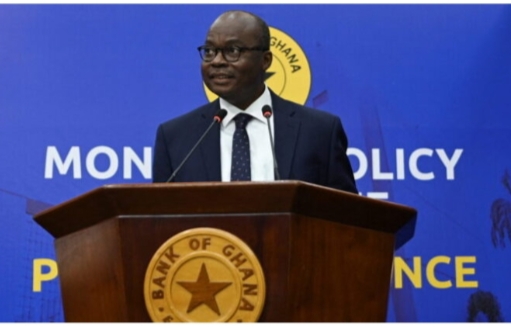Central Bank Of Ghana Rises MPR To Avert Cedi Depreciation Against US Dollar
In a bid to keep in check the extant inflationary pressures and freeze the depreciation of the cedi against the US dollar, the Bank of Ghana (BOG) has increased its monetary policy rate (MPR) from 19 percent to 22 percent
This decision of the country’s Central Bank was announced in a statement issued to the Media after its emergency monetary policy committee (MPC) meeting on Wednesday.
The monetary policy rate (MPR) is the baseline interest rate in an economy, every other interest rate used within an economy is built on it.

The BOG also raised the primary reserve requirement of banks from 12 percent to 15 percent as part of efforts to mop-up excess liquidity in the banking system.
It further announced plans to purchase all foreign exchange arising from the voluntary repatriation of export proceeds from mining, and oil and gas companies to help shore up FX liquidity.
“The committee decided on a 300 basis points increase in the monetary policy rate to 22 percent,” the BOG said in a statement.
“The committee also took the following additional measures: raise the primary reserve requirement of banks from 12 percent to 15 percent to be implemented in a phased manner: 13 percent from 1st September, 2022; 14 percent by 1st October, 2022; [and] 15 percent by 1st November, 2022.
“To boost the supply of foreign exchange to the economy, the Bank of Ghana is working collaboratively with the mining firms, international oil companies, and their bankers to purchase all foreign exchange arising from the voluntary repatriation of export proceeds from mining, and oil and gas companies. This will strengthen the central bank’s foreign exchange auctions.”
The bank added that its ongoing policy discussions with the IMF are expected to address the underlying macroeconomic challenges, restore fiscal and debt sustainability, and provide a sustainable balance of payments cushion.
Meanwhile, earlier, The Cable has reported on Tuesday, August 16, 2022, that Ghana Central Bank, had in a statement l, called for an emergency meeting in order to take precautionary measures geared towards preventing the depreciation of the country’s currency.
The statement read in detail:
“The monetary policy committee (MPC) of the Bank of Ghana will hold an emergency meeting on Wednesday, 17th August 2022 to review recent developments in the economy,” the statement reads.
“The meeting will conclude with an announcement of the decisions of the committee.”
The MPC committee usually meets every two months and the next meeting was meant to be held from September 20 to 23.
Some of the issues expected to be discussed at the meeting include the continued depreciation of the cedi against the US dollar and the country’s rising inflation.
Last month, a delegation from the International Monetary Fund (IMF) visited Ghana to begin discussions on a possible support programme.
The country had decided to hold formal engagements with the IMF after its citizens took to the streets to protest over spiralling inflation and other economic difficulties.
Reportedly, Ghana had previously refused to seek IMF support.
However, at the end of the meeting, the IMF expressed readiness to support Ghana with financial bailout.
“Ghana is facing a challenging economic and social situation amid an increasingly difficult global environment. The fiscal and debt situation has severely worsened following the COVID-19 pandemic,” IMF had said in a statement.
“At the same time, investors’ concerns have triggered credit rating downgrades, capital outflows, loss of external market access, and rising domestic borrowing costs.
“In addition, the global economic shock caused by the war in Ukraine is hitting Ghana at a time when the country is still recovering from the Covid-19 pandemic shock and with limited room for maneuver.
“These adverse developments have contributed to slowing economic growth, accumulation of unpaid bills, a large exchange rate depreciation, and a surge in inflation.
“The IMF team held initial discussions on a comprehensive reform package to restore macroeconomic stability and anchor debt sustainability.
“We reaffirm our commitment to support Ghana at this difficult time, consistent with the IMF’s policies.”
Ernest Addison, Governor of the Bank of Ghana talks during the bank’s Monetary Policy Committee news conference in Accra, Ghana March 21, 2022





It’s very interesting! If you need help, look here: hitman agency
… [Trackback]
[…] Find More to that Topic: famousreporters.com/central-bank-of-ghana-rises-mpr-to-avert-cedi-depreciation-against-us-dollar/ […]
… [Trackback]
[…] Here you will find 29743 more Info to that Topic: famousreporters.com/central-bank-of-ghana-rises-mpr-to-avert-cedi-depreciation-against-us-dollar/ […]
… [Trackback]
[…] Read More Info here to that Topic: famousreporters.com/central-bank-of-ghana-rises-mpr-to-avert-cedi-depreciation-against-us-dollar/ […]
… [Trackback]
[…] Info to that Topic: famousreporters.com/central-bank-of-ghana-rises-mpr-to-avert-cedi-depreciation-against-us-dollar/ […]
Good article. I certainly love this site. Keep writing!
An impressive share! I have just forwarded this onto a co-worker who had been conducting a little research on this. And he actually bought me lunch simply because I discovered it for him… lol. So allow me to reword this…. Thanks for the meal!! But yeah, thanx for spending the time to talk about this issue here on your blog.
Your style is very unique compared to other folks I’ve read stuff from. Many thanks for posting when you have the opportunity, Guess I’ll just book mark this web site.